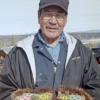|
David and Kitty David, Interview 1 |
I interviewed Kitty and David David on the evening of November 20, 1992 sitting around their dining room table in their cabin in Allakaket, Alaska. At first David was rather quiet, but he spoke up more as he became more comfortable with working with the tape recorder. One of Kitty and David's granddaughters who lives with them quietly watched a video with a friend while we taped. Kitty began the interview by talking about her family and her experiences growing up in traditional camps on the Alatna River, and then moving into the village of Alatna to attend the missionary school in Allakaket run by Miss Bessie Kay. Out in camp, her father helped her learn to read with magazines, and she managed to get a fifth grade education. Kitty also talked about her relatives on the Kobuk River. She told how her father traveled there by dog team to trade. Kitty's discussion of the missionary nurse, Miss Hill, and how she struggled to treat people with almost no medication led Kitty to talk about tuberculosis and how it affected the community. In the old days, most elders with TB died. When treatment became available, people had to leave the community, going to places like Fort Yukon, where her sister, Bertha Moses, and her husband, Johnson, went, and Mt. Edgecumbe near Sitka, where her father was sent. Kitty also talked about her work as a community health aide. She describes how in becoming a health aide she is following in the footsteps of her sister Bertha, who was Allakaket's health aide for many years. Kitty was inspired also by the missionary nurse, Miss Amelia Hill, who spent almost thirty years serving the people of Allakaket. Kitty feels that local patients feel more comfortable and are more open when they are treated by a local person. At the end of our discussion Kitty talked about the values that are important to keep for future generations. Subsistence is very important. Education and jobs take people away to the cities where they can't hunt and trap and too much television isn't good for their health. Women need to learn traditional skills again, sewing and making mukluks, fishing, berry picking, how to store food for the winter. She lamented that people don't go out to fish camp very much today. Like his wife, David talked about the values he felt people should keep and pass on to future generations. He talked about how important it is today to get an education. In today's cash economy young people have to learn a living. But he also talked about how important it is to go to fish camp and be on the land. He says that having a mixed economy is best, and to do so one also needs the skills to continue subsistence. David also talked at some length about raising and training sled dogs, for he is known for this skill. He talked about his first experience driving dogs. He was nine and he had two dogs. He used dogs for hauling wood and other chores and over the years the size of the teams he drove grew. He got into racing with seven dogs in l955, taking a third place. Over the next several years he continued racing placing in some of the big races in Fairbanks. He finally stopped racing and even keeping sled dogs because of the cost.
|
93-15-53 |
Gates of the Arctic National Park |
Nov 20, 1992 |
|
David and Kitty David, Interview 2 |
David and Kitty David were interviewed in February 2004 by Eric Mack in Allakaket, Alaska for the Raven's Story radio series on KIYU-AM public radio station in Galena, Alaska. In this interview, the Davids talk about living a traditional subsistence lifestyle based on hunting, trapping and fishing and the challenges of raising a family at remote camp locations. They talk about their own childhoods of growing up at camps, traveling by dogteam, hunting in the moutains, attending church, and earning money as firefighters. Kitty tells some traditional Athabascan scary stories and they mention the 1994 flood on the Koyukuk River.
The interview was edited and produced by Clinton Brown.
|
2004-01-26 |
Raven's Story |
Feb 1, 2004 |

